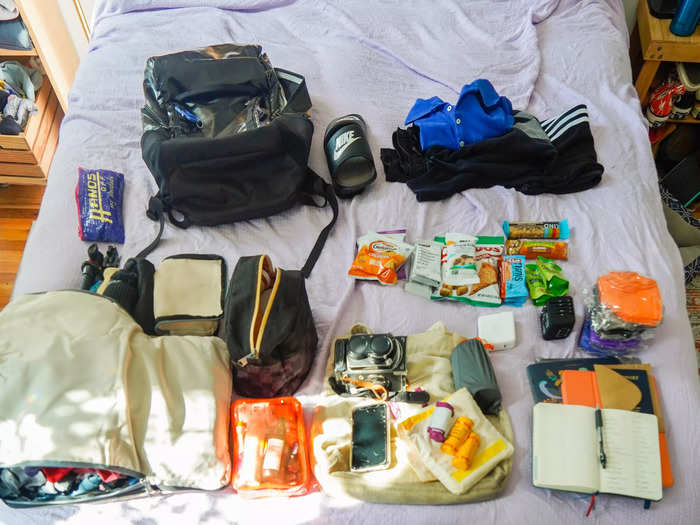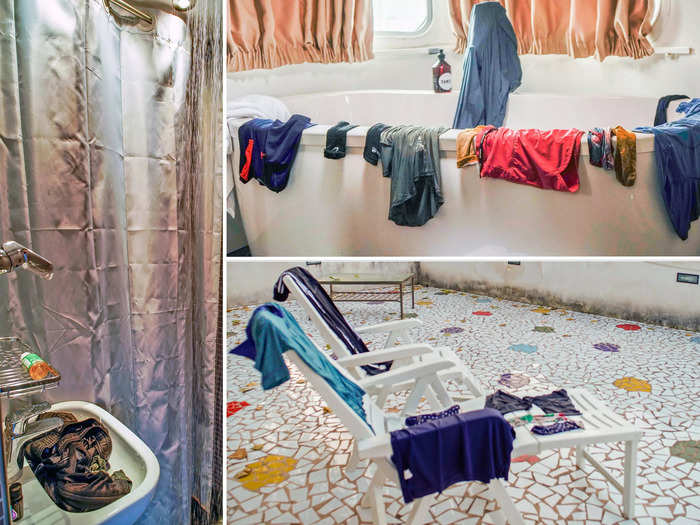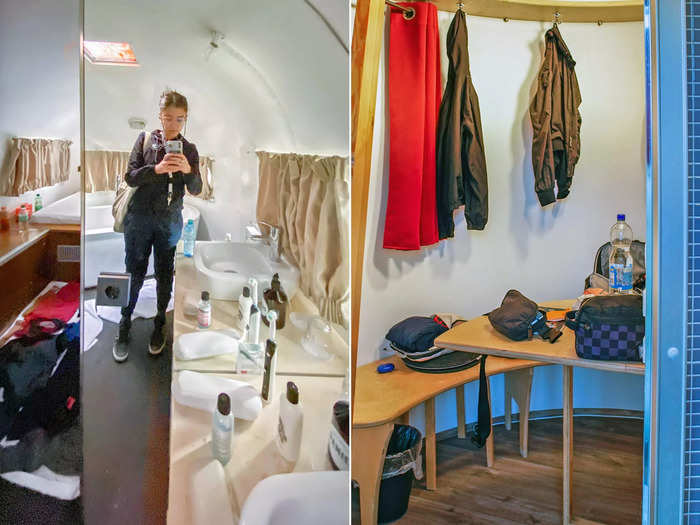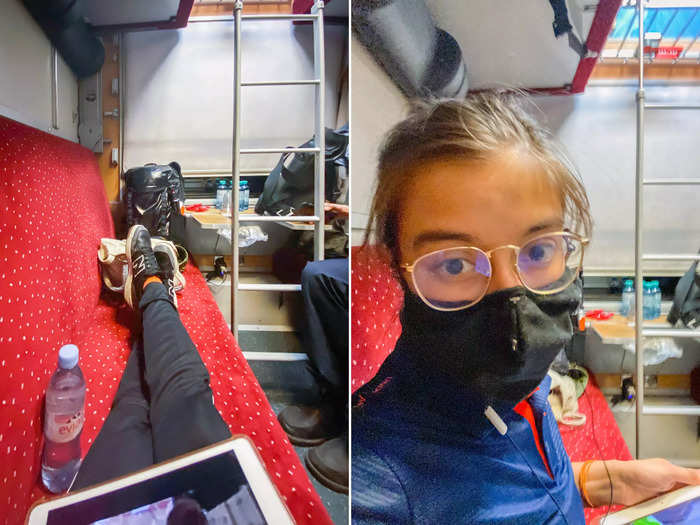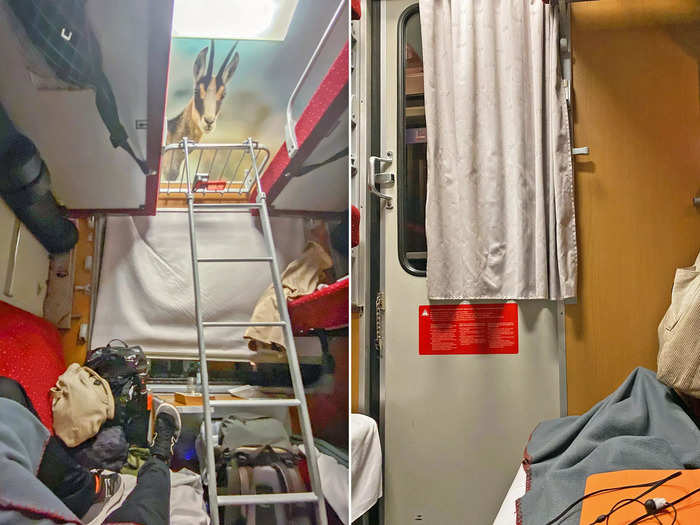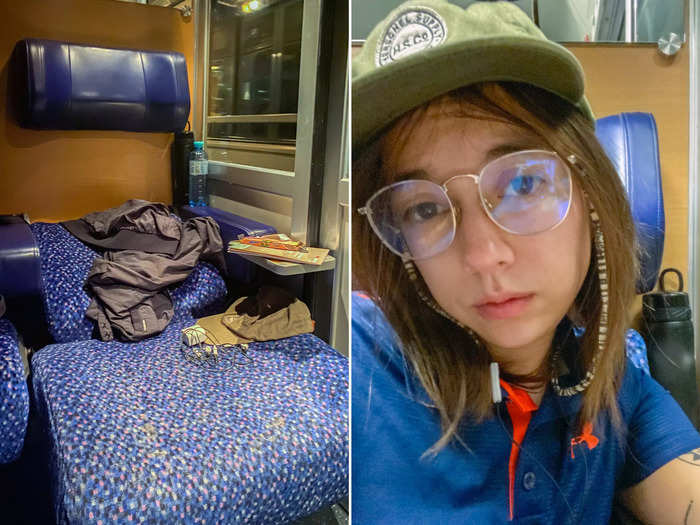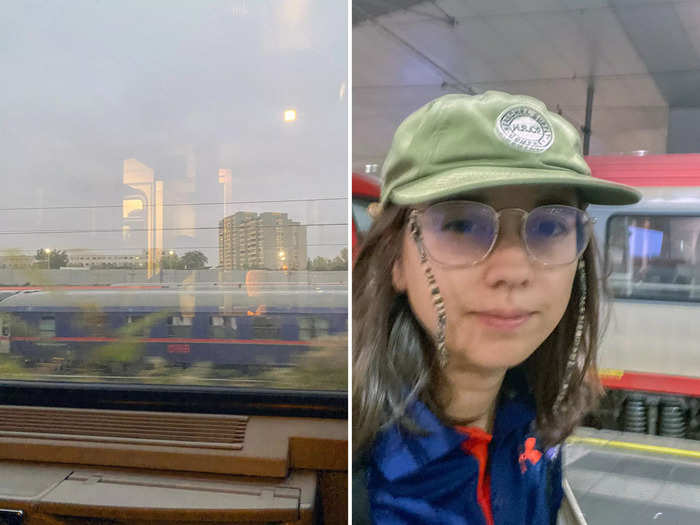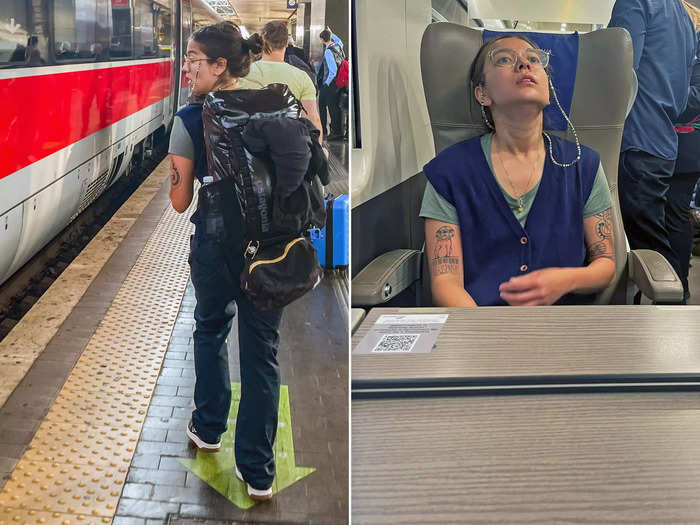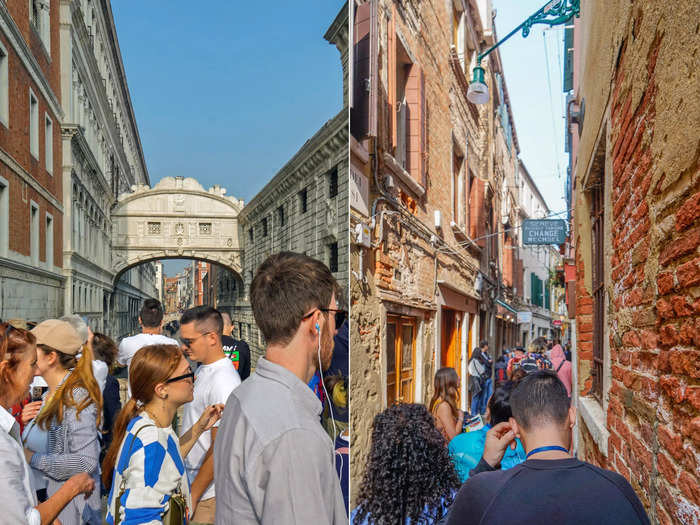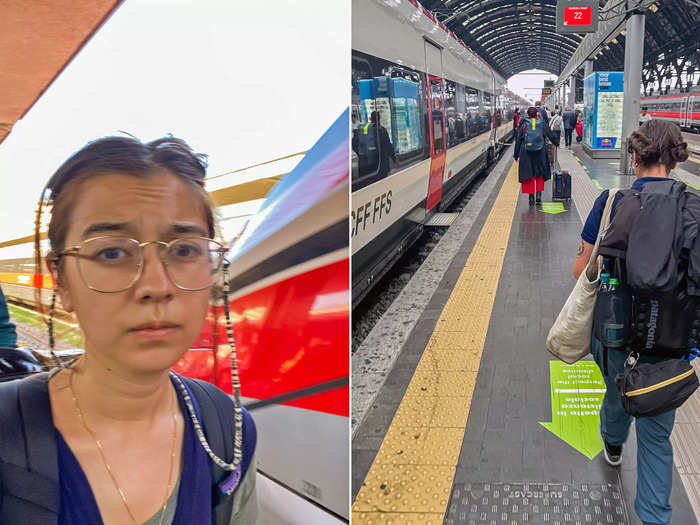Business Insider's reporter expected an Instagram-like backpacking adventure in Europe, but the reality was much less glamorous.Joey Hadden/Business Insider
- I spent two weeks backpacking through Europe for the first time in October 2022.
- I found that it wasn't the glamorous, romantic adventure that it often looks like on Instagram.
With a passion for fashion, traveling with just a backpack never appealed to me before 2022. There were always too many things I wanted to pack.
But since I began traveling more as a travel reporter for Business Insider three years ago, I've realized I needed to lighten my load to make it easier to hit the road for longer periods of time.
I made the minimalist travel style a priority in August 2022, when I spent a week backpacking for the first time through Eastern Canada. It turned out to be a lot easier — and more efficient — than I'd originally thought.
So when I planned a two-week train trip through four European countries two months later, I decided to push myself to fit everything I needed into my backpack again.
Over the course of two weeks, I backpacked across Germany, Austria, Italy, and Switzerland while exploring the cities of Berlin, Vienna, Venice, Rome, Milan, and Zürich. It was my first time visiting each country and backpacking in Europe.
As part of my travels, I slept in shared train cabins and budget Airbnbs, and initially, I felt like I was living the life of young adults on a gap year, or post-college students on a big adventure.
But I quickly realized it wasn't as glamorous as I expected it to be based on stories I'd heard from other people, or more commonly, pictures I saw on social media.
On Instagram, I've often seen epic photos of an empty nature scene save for the backpackers with a caption about life being an adventure.
But after backpacking Europe myself, I found that the travel style was full of hardships I rarely see posts about.
First, I found that my biggest backpack couldn't squeeze in all the clothes I wanted to bring.
Everything the author packed for her two-week trip to Europe. Joey Hadden/Business Insider
I picked the largest bag I own — a 32-liter backpack — for my trip to Europe.
I wasn't sure how well this bag would work for a two-week trip, so I practiced packing as lightly as possible to ensure I could fit everything.
I started with my work gear, which included a laptop, cameras, lenses, and a notebook. Then I packed chargers, toiletries, and snacks before realizing my work gear and other essentials were taking priority over clothes.
I was hoping to bring two packing cubes full of clothing, but I could only fit one in my bag. This cut my proposed wardrobe in half. I ended up only having room for two polos, one T-shirt, one long-sleeve T-shirt, three pairs of pants, a sweater, a blazer, a dress, and two light jackets.
Although I impressed myself by packing lighter than I ever had while still having everything I needed for the longest trip I'd ever taken, I couldn't help but feel disappointed in my limited outfit choices.
Because I could only bring a few garments, I had to do laundry at nearly every accommodation.
The authors laundry in Germany (left), Austria (top), and Italy (bottom). Joey Hadden/Business Insider
I've never seen a backpacking social media post about doing laundry, but I found myself washing my clothes at nearly every Airbnb I stayed in.
I stayed in each accommodation for just one or two nights, so to ensure my clothes would be dry before checking out, I had to prioritize doing laundry as soon as I checked in.
I brought my own laundry soap and used sinks and bathtubs to wash each garment before hanging them up to dry.
This was a bummer since I often arrived at each accommodation feeling exhausted from travel, and washing my clothes was the last thing I felt like doing.
Coming home to tiny Airbnbs with wet clothes everywhere stressed me out after a day of exploring.
Staying in small, cluttered spaces made the author feel stressed in Austria (L) and Germany (R). Joey Hadden/Business Insider
From a converted wine barrel outside Zürich to an Airstream trailer in Vienna, most of my Airbnbs were tiny homes with less than 100 square feet in size. So even a little bit of clutter made them look messy to me.
I also thought having my clothes hanging to dry made the spaces feel even more chaotic.
Each time I returned to my accommodations, I was greeted with a disheveled space that made me feel stressed out. Since I work hard to keep my apartment looking spotless at home, I wasn't used to living in a cluttered space. I found it hard to relax in these rooms after tiring days of exploring.
I thought a sleeper train would be a smart way to arrive in new cities and maximize my time, but these shared cabins felt cramped and uncomfortable.
The author rides a Nightjet sleeper train in Europe. Joey Hadden/Business Insider
I booked two overnight trains during my trip. I thought this would be the best way to travel through Europe so I could explore more during the day.
But the small, uncomfortable spaces I had to travel in for long periods of time made it hard to sleep.
To get from Vienna to Venice, I booked a bunk in a shared cabin on an overnight train run by Nightjet, a rail line that operates overnight routes between Austria, Italy, France, and the Netherlands.
Since I booked a shared room with up to five other people, I expected to feel a little cramped, but I anticipated being able to move around the room freely.
However, I found that the 74-square-foot cabin didn't feel like enough space for myself and the other travelers, especially with everyone's luggage. Our cabin only had four people in it, and I thought it would have been even more uncomfortable had it been fully booked with six people.
There was space for bags above the beds, but not enough for everyone. I couldn't do much more than sit in my bunk and quickly became disappointed by my choice to travel in this way.
I was also surprised by the lack of privacy inside the shared bunk cabin on the train.
The author's shared sleeper cabin on an overnight train from Austria to Italy. Joey Hadden/Business Insider
Before my trip, I imagined that each bunk in the shared cabin on the sleeper train would have a curtain for privacy. However, the beds were completely exposed, so I had to go to the bathroom to change into my pajamas privately.
I also had to wake up another traveler using the top bunk in the middle of the night to use the bathroom since the room's lock was only accessible from their bunk.
After this experience, I don't think I'll ever bunk with strangers on an overnight train again, especially since some Nightjet routes have private cabins.
"Offering our passengers a high level of travel comfort is an important concern for us," a representative for ÖBB Nightjet told BI. "We are constantly working on improvements to our product and also take into account the requirements of our customers."
But I thought my experience was even worse on the other overnight train I took where I booked a regular seat and didn't sleep at all.
The author felt restless on an overnight train from Germany to Austria. Joey Hadden/Business Insider
On my other overnight train from Berlin to Vienna, I had an even harder time sleeping. I sat in a seating carriage room with six seats facing each other, which is Nightjet's version of standard coach seating.
During my leg of the journey, three travelers were already there when I boarded, and two others arrived within the first few hours. Right away, I thought the room was cramped and lacked enough legroom for each traveler.
The seat appeared slightly wider than a typical train coach seat, with two cushions, and reclined far enough to almost lay flat, but not fully. I reclined mine all the way, but I thought the gap between the seat back and the bottom of the seat made it tough to get comfortable.
When I tried to sleep, I found it impossible with the constant bumps on the ride and so many people around. I ended up staying up until the morning and regretted traveling overnight.
"The quality of travel depends not only on the carriages, but also on the route," OBB Nightjet wrote in a statement to BI. "We recommend the sleeper or couchette car for night travel. There is enough space to stretch out. Seated carriages are recommended for shorter journeys."
While some influencers might like this type of travel, next time, I'll stick to daytime routes if I can't sleep flat on a bed in a private room.
I often arrived in each country feeling exhausted from lack of sleep, which made it harder to enjoy my time in each place.
The author arrived in Vienna feeling exhausted. Joey Hadden/Business Insider
Because I had so much trouble sleeping on both overnight train rides, I often arrived in a new city feeling tired and depleted instead of excited and ready to start exploring.
When I got to Vienna at 7 a.m. after a sleepless night in the seating carriage, I was so exhausted that I looked for any hotel that would take me in so early in the morning. I thought this made the overnight ride ultimately not worth the time saved since I didn't do anything when I arrived other than sleep.
And when I got off the train in Venice, while I had enough energy to explore since I got some sleep in the bunk, I still felt fatigued, and it took away from how much I was able to enjoy that first day.
As a result, my first day in both cities felt disappointing, and that my plan to save time and energy backfired. I couldn't help but think I wasted two days that could have been spent feeling more appreciative of the city surrounding me, had I gotten enough rest.
In fact, a lot of my trip was more physically draining than I anticipated because carrying my backpack each day made my body sore.
The author sores her back from carrying her bag. Joey Hadden/Business Insider
On travel days, I had to carry my backpack for long periods of time. I wore it on the go to catch my train. When I arrived in a new city, I had to keep it on my back until I was able to check into my accommodation. And then I'd repeat the entire process when I checked out before catching a train to my next destination.
I've certainly never seen any Instagram posts about these bags being comfortable. Each day, after wearing my backpack while walking for extended periods, all of my muscles felt incredibly sore.
In these moments, I was surprised to find myself questioning if a backpack really is more convenient than a carry-on suitcase. Sure, a carry-on suitcase is larger and often needs to be wheeled around, but after lugging around my backpack all day, I felt like it could be easier to roll a suitcase around, and it would have been better for my body. Plus, I'd be able to pack more.
Large crowds made having a backpack even harder. I thought traveling in October — the end of shoulder season — would help me avoid this, but I was wrong.
Narrow alleys were filled with people in Europe, according to the author. Joey Hadden/Business Insider
In most photos of backpackers I see on Instagram, it looks like they're completely alone in a dramatic scene, whether it's a scenic landscape or a major tourist attraction.
But I found that even during the shoulder season, which is when I was in Europe, this was never the case. From Rome to Zurich, I trudged through places that were overrun with tourists.
Throughout my trip, I stood on tippy toes to see popular historic sites above rows of heads obscuring my view. I found that even getting just one photo of myself at tourist hot spots, like the Colosseum in Rome, felt nearly impossible. And since I'm 5'3, I found it hard to see these sights over the heads and smartphones of the people around me.
I also wasn't used to the weight and size of my backpack, which made it challenging to get around. In crowded spaces, I kept forgetting that the backpack made me about a third larger than I typically am. In busy streets and train stations, I found myself bumping into people with my pack before realizing that I needed to reconsider how I was taking up space.
Next time I plan a trip to Europe, I'll visit in the offseason for fewer crowds.
While it wasn't a picture-perfect adventure, backpacking through Europe made me realize that you can't plan out every second, and maybe that's a good thing.
The author backpacks in Europe. Joey Hadden/Business Insider
While there were a handful of hardships, I found that backpacking in Europe was full of good surprises, too.
For example, I initially thought seeing so many new places in a short time would make them blend together in my mind, but each city felt genuinely unique and left me with distinct memories. And without my backpack, I probably wouldn't have been able to travel to as many places in one trip.
I'll never forget how alive Berlin felt with its lush pockets of greenery, dramatic murals, and street performers, or how Vienna's garden mazes and fairy tale architecture made me feel like royalty — even with a turtle shell on my back.
Ultimately, I thought the good surprises outweighed the bad, so I would definitely backpack in Europe again. But next time, I'll avoid shared accommodations, overnight rides, and the busy season.

